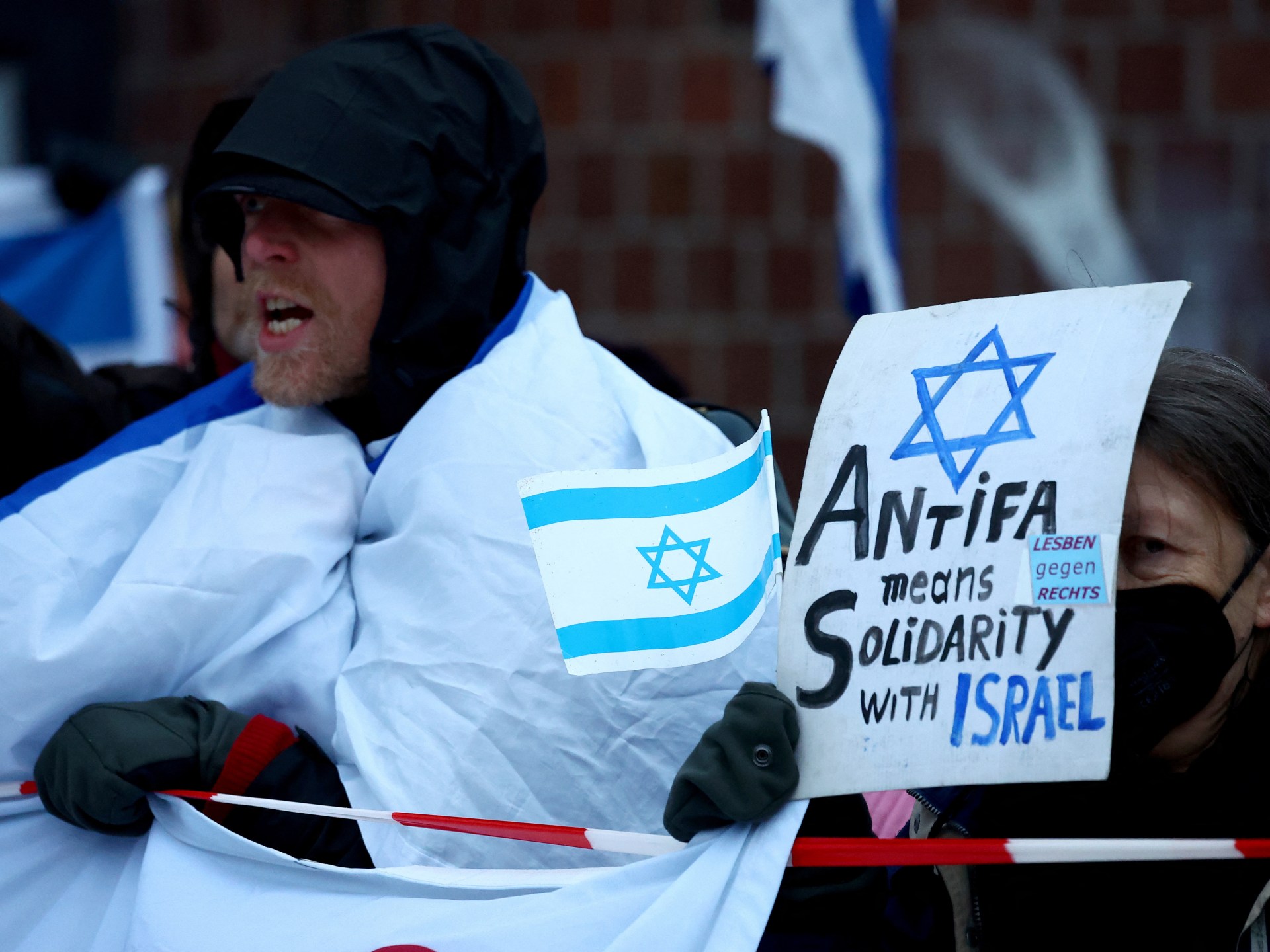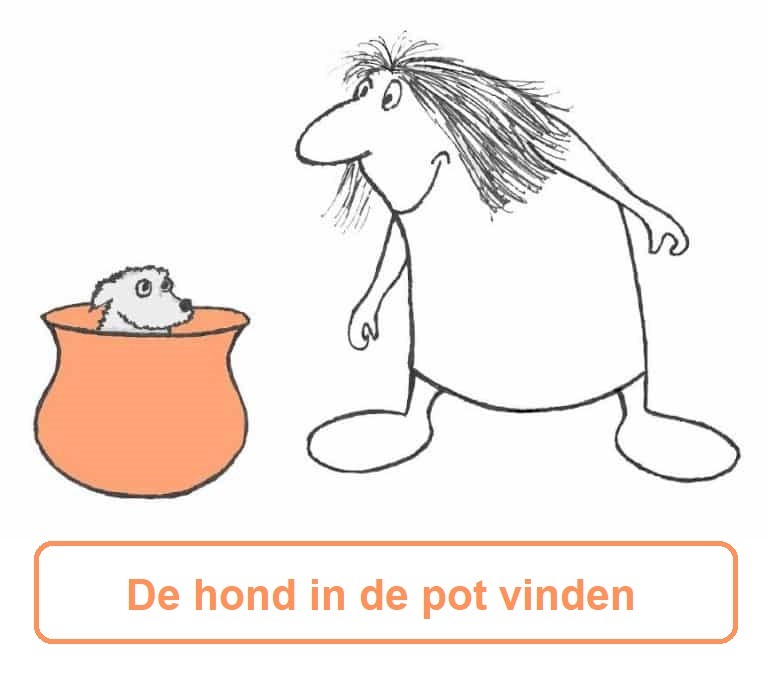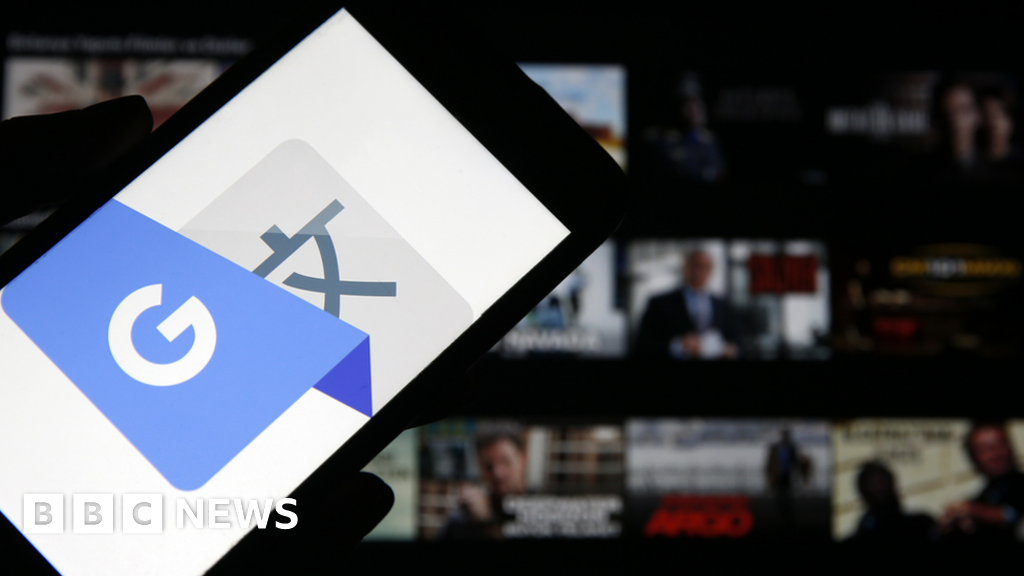Germany’s much lauded ‘memory culture’ is pure, empty, self-congratulatory propaganda.
Rachael Shapiro — Anti-Zionist Jewish activist based in Berlin
Published On 1 Mar 20241 Mar 2024
I am a #Jewish #pro-Palestine solidarity activist originally from the #NewYork area and now based in #Berlin. My #grandmother was a #Holocaust survivor from #Cologne who fled to the #UnitedStates during the Second World War at the age of 16. Her parents and much of her family were murdered during the Holocaust. I came “back” to #Germany about five years ago, a decision born largely out of the desire for intergenerational healing for me and for my grandmother, who was alive at the time. I learned German and was able to speak to her in her native language in the last few years of her life. I told her stories about living in Germany, she met some of my friends and she was grateful for the ways in which the country and its people had apparently evolved and atoned for their ugly history.
I am glad she died before I had the opportunity to recognise what a naive, idealistic delusion this was.
In the past few years as I have educated myself, become active in the movement for #Palestinian #liberation and extracted myself from the extreme #Zionist conditioning and #brainwashing baked into the fabric of my upbringing, my appreciation for German “Erinnerungskultur” (“memory culture”) has steeply devolved into the realisation that the entire concept is pure, empty, self-congratulatory propaganda. It is grounded in the intentional, racist displacement of anti-Semitism and responsibility for the Holocaust from the Germans who perpetuated it to the #Arabs, #Muslims and, above all, the #Palestinians, who they now demonise and scapegoat as a deflection and distraction.
A documentary from 1985, Ma’loul Celebrates Its Destruction, provides an account of the destruction of entire villages during the 1948 #Nakba. In it, an interviewer says to a Palestinian man who was displaced: “But they killed six million Jews.” His rightful response is, “Did I kill them? Those who killed them must be held accountable. I haven’t hurt a fly.” The fact that a truth this fundamental has been so deeply buried in the language of “complexity” and “conflict” is a testament to the commitment and breadth of the imperialist narrative disseminated by Israel, the #US and #Germany (and the #West in general). Meanwhile, more than 90 percent of all anti-Semitic incidents in Germany are attributable to the #far-right despite the media’s rampant efforts to ignore statistics, skew the reality of the violence and racism directed at Palestinians, and disguise the true apathy towards the so-called “fight against anti-Semitism”.
While actual incidents of anti-Semitism go largely unpunished, those of us standing in solidarity with Palestine are accustomed to brutal, state-sanctioned violence, repression and surveillance from police and the German government in response to peaceful #protests and #boycotts. This has intensified massively since the #genocide in #Gaza began in October, regularly under the guise of accusations of anti-Semitism and “Judenhass” (“hatred of Jews”). We are accordingly committed to remaining loud and visible, including through our refusal to be excluded from the fight against rising fascism and the extreme-right Alternative for Germany party ( #AfD ).
On February 3, I attended an #anti-AfD demonstration in Berlin as part of the pro-Palestinian bloc with the revolutionary #Marxist group #Sozialismus #von #Unten (“Socialism from Below”), in which I am an active member. I had quite a bit of trepidation about going to this protest after the violent, racist and disturbing experiences of my Palestinian and pro-Palestinian comrades at anti-AfD protests over the past few weeks. Folks protesting the AfD while showing solidarity with Palestine have been ruthlessly harassed, attacked, reported to the police and violently removed by both demonstrators and cops all over Germany.
In general, the #mood was positive, and there seemed to be more of a tangible solidarity in comparison with the earlier demonstrations. I stood with a sign that read, “ #Juedin #gegen die #AfD und #Zionismus, #fuer ein #freies #Palaestina” (“ #Jew #against the #AfD and #Zionism, #for a #free #Palestine”). We handed out flyers encouraging a strategic and systematic mobilisation against the AfD. We spoke to demonstrators about the link between fighting fascism and fighting for Palestinian liberation. We explained that Palestinians in Palestine are currently suffering under the fascist policies we are demonstrating against in Germany, and in Germany, Palestinians and those standing in solidarity with them are already experiencing the concrete infringement and denial of #fundamental #human #rights ( #freedom of speech, freedom of expression, freedom of assembly). We emphasised the importance of unconditional, #international #solidarity.
Some were cautious about engaging, ostensibly out of concern for being viewed as anti-Semitic, but many were curious, interested and open to learning. As much as the mainstream media have tried to distort and mangle news of the ongoing genocide in Gaza, a recent poll showed that among German voters, only 25 percent answered in the affirmative when asked if they believe Israel’s attacks on Gaza are justified; 61 percent believe they are not. The latter cohort was clearly represented at the demonstration.
After about an hour, I came into contact with a representative of the 25 percent of that poll. An older German man with an aggressive expression approached me, stopped in front of me and half-shouted, “So what do you think the #similarities are #between the #AfD and #Israel?” I could tell he had no intention of engaging in a reasonable conversation but nonetheless began trying to explain. After a few words, he rolled his eyes and spat at me.
It is hard to describe the particular shade of red I saw, the sourness of the blood pumping to my head, the bitterness of the fury on my tongue. It looked like the lifeless faces of my great-grandparents at the mercy of #Nazis, deported and murdered in the #Warsaw #Ghetto as they have appeared in my dreams since I was a child. It felt like the fierceness with which I will unconditionally defend the Palestinian resistance, the right of every people to resist their oppressor in any single form, until my last breath. It tasted like the rage and incredulity that have boiled in the corners of all of our mouths as we scream at the top of our lungs, watching the world passively observe the slaughter of Palestinian men, women and children for more than four and a half months – silent, complicit and accompanied by the relentless echo of more than #75 #years of #occupation, #apartheid, #theft, #ethnicCleansing, #lies, #dehumanisation and unforgivable #injustice.
I ran after the man, shouting at him that my family was murdered because of fascism during a genocide – in response to which he spat at me again.
He goaded me: “What do you know? The AfD is a fascist party. What does that have to do with Israel?” I began to state the obvious – “Israel is committing a genocide in Gaza as we speak …” – but didn’t finish my sentence before he spat in my face for a third time.
As I was shaking, incensed and disgusted, my final comment was, “You are clearly an anti-Semite.” Up to this point in the interaction, he had been condescending and full of contempt, but (as I knew it would) this final shot sent him into a blind rage. As I turned and walked away, he shrieked: “WHAT did you say to me?”
A friend of mine recently said to me, “The #Germans will #never #forgive the #Jews for the #Holocaust.” These words have rung in my ears and sat in my chest with nowhere in particular to go, a hard, ugly truth at the core of German society that precisely reflects my experience living in it. It is bewildering, it is comical, and it is accurate.
From the neo-Nazis of the AfD to “anti-Deutsche” leftists who claim to be combatting German anti-Semitism by obsessively and unconditionally supporting Zionism, many of today’s Germans are brimming with repressed rage towards Jews. Whether they are aware of it or not, this is resoundingly apparent in the deep, hysterical hypocrisy of a reaction such as that of the man at the demonstration – spitting in a Jewish person’s face for standing against fascism and genocide on the basis of her personal, generational relationship to fascism and genocide and becoming enraged at being identified as an anti-Semite accordingly.
This fury is seemingly a reaction to the “injustice” of Germans having to repent for the actions of their ancestors, something they have been widely celebrated for on the global stage. The #resentment takes the form of #narrowmindedness and #bigotry: The only acceptable concepts of #Judaism, #Jewish people and “Jewish life” are those they themselves, #non-Jewish Germans, explicitly sign off on. (Refer to the “anti-Semitism commissioners” claiming to represent the interests of Jewish people in Germany – not a single one of whom is Jewish or an expert in any relevant or related field.) For many Germans, the only palatable Judaism is Zionism, which in fact is no kind of Judaism at all. When forced to contend with perspectives in conflict with this toxic narrative or with Jewishness that doesn’t align with their understanding of it, their anger surfaces violently, explosively. “Anti-Deutsche” weaponise the fetishisation of Jews through their obsessive Zionism to an extreme degree, spearheading aggressive hate and smear campaigns against those who do not share their views (including anti-Zionist Jewish people). How dare anyone, most of all Jews, call into question the authority of Germans in defining and relating to Judaism, anti-Semitism and genocide.
The sick, decades-long collaboration between Israel and Germany and the widespread assertion that Israel’s security is “Germany’s reason of state”(“Staatsraeson”), which upholds Zionist socialisation in the interests of political, racist ends, has created an atmosphere of fear, shame, guilt and ultimately self-righteousness that permeates much of German society. It punishes questions, dissuades education and quashes the necessary understanding of Judaism as a broad, differentiated and historically diasporic culture that existed long before Zionism – and will exist long after.
This designation of all Jews and all Judaism as a single uniform entity, necessarily speaking the same language (modern Hebrew), holding the same values (Zionism) and sharing an identical culture (which in Germany, must be determined by Germans), is, in fact, the precise definition of #anti-Semitic, #Nazistic #racial #segregation and the othering, dehumanising rhetoric they employed in its service. The rigid and inherently anti-Semitic conception of Jews as an undifferentiated people “native” to one land, characterised by the nationalist settler-colonial Zionist movement, has merely served as a #continuation of #Hitler’s #work. It has erased secular Judaism in Europe. It has #eradicated the #Yiddish, #Ladino, #Judeo-Arabic, #Judeo-Persian and #other #Hebraic #languages. Eighty years after the Holocaust, it has succeeded in upholding the view of Jews as a monolith, a foreign nuisance separate from German society, the attempted annihilation of whom can now be exploited to justify the annihilation of another group.
The #tradition of #policing #Jewishness has been passed down in Germany for generations now, which, as in the case of the man at the anti-AfD demonstration, revolves not just around an established, homogenous definition of Jews but, crucially, also the exclusive right and obligation of the Germans to dictate it.
So what are we left with? I believe we can see it in our aforementioned statistic. The majority of Germans know, despite what they have been raised and conditioned to believe, that at the very least, what is going on in Gaza is wrong. Many can see that there is something significant and conspicuous missing in the mainstream narrative around anti-Semitism, Israel and Palestine. I would venture that the majority of those in the streets marching against the AfD are doing it because they genuinely want to stand on the right side of history. Meanwhile, what is in reality a minority is simply louder, angrier and more visible in propagating their anti-Arab, anti-Muslim and anti-Palestinian racism, anti-Semitism and pro-genocide views and, in being so, intimidate the rest into docile silence.
#No #one in the mainstream German #media has reported on my experience at the anti-AfD protest. Given the cultural context, this is not a surprise. But highlighting this hypocrisy and the prevailing, ever-more destructive narratives illustrated by such an incident represents a powerful opportunity for education and empowerment. Calling out the root causes and social backdrop of this moment make them available and necessary for all to grapple with. As so many are stepping into the streets, it is our responsibility to arm them with the facts as fuel, to enable every single person to raise their voice and know decisively what they speak for and what they speak against. We will continue – with more resolve than ever – in the fight for a free Palestine and in mobilising in this way against racism, Zionism, (actual) anti-Semitism, fascism and genocide. We will repeat it again and again until the rhythm of our words becomes the heartbeat of a society that attempts to snuff out our resistance but will ultimately fail at doing so: Never again means never again for anybody.
The views expressed in this article are the author’s own and do not necessarily reflect Al Jazeera’s editorial stance.











 Leer Nederlands ! / Learn Dutch ! / Apprenez le néerlandais ! / Lernen Sie Niederländisch ! / Imparate l’olandese !
Leer Nederlands ! / Learn Dutch ! / Apprenez le néerlandais ! / Lernen Sie Niederländisch ! / Imparate l’olandese !







